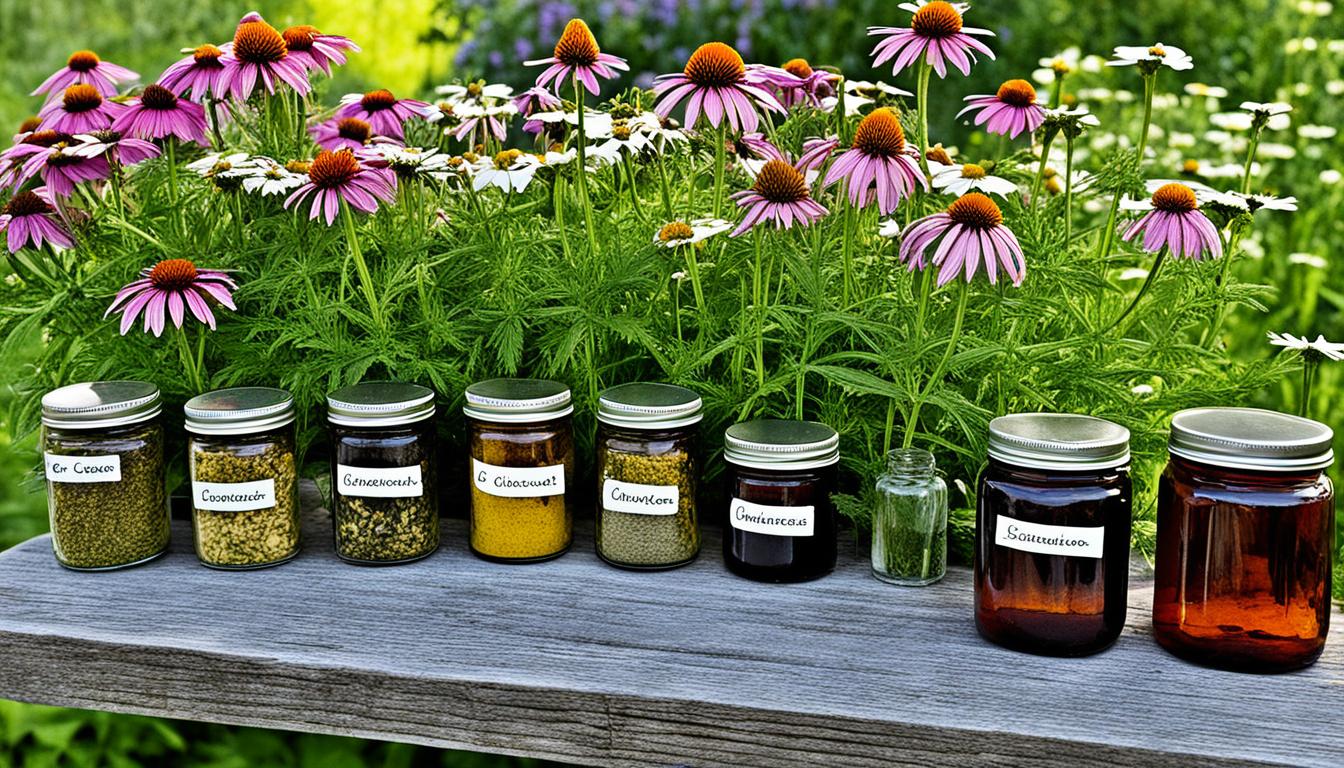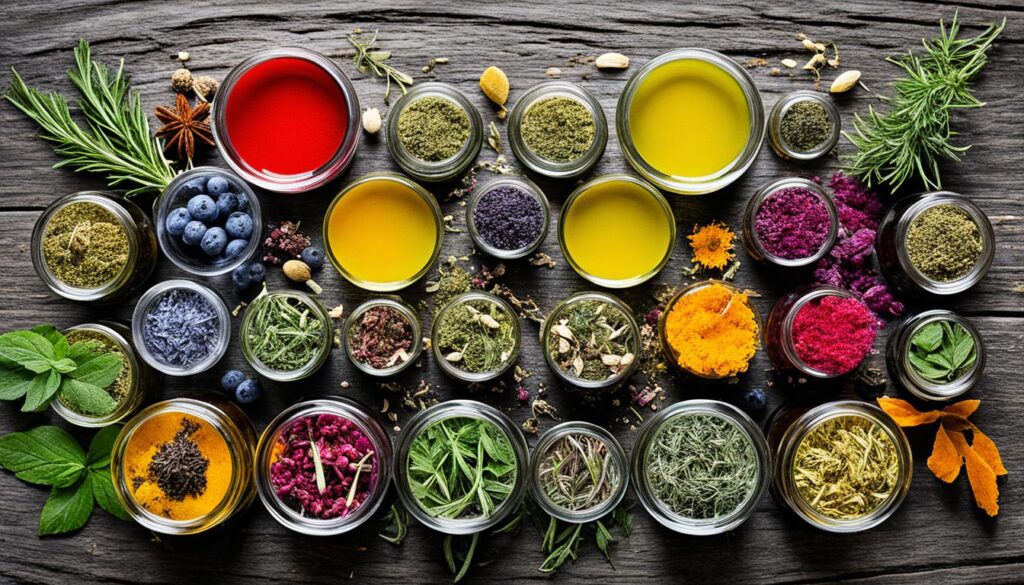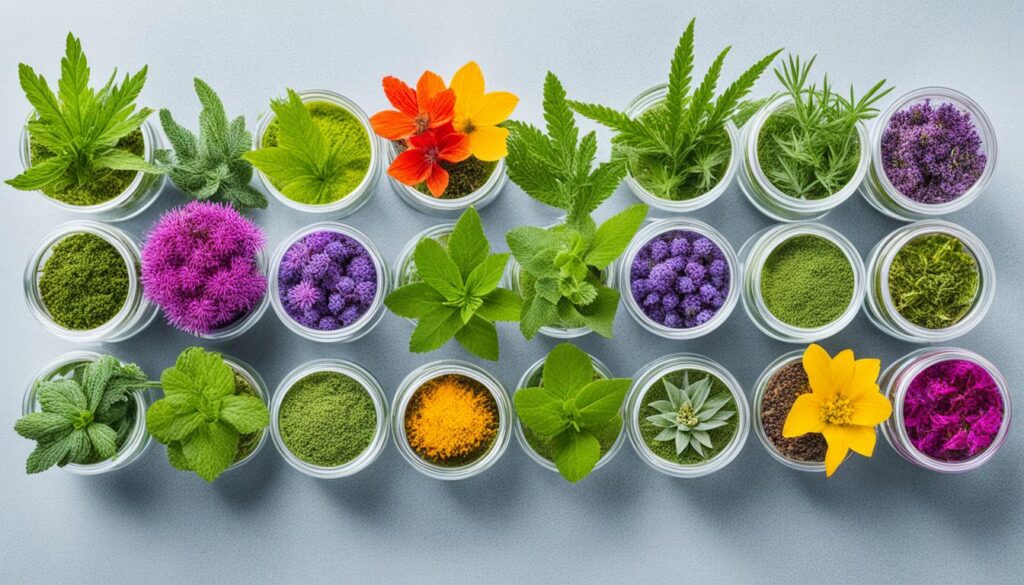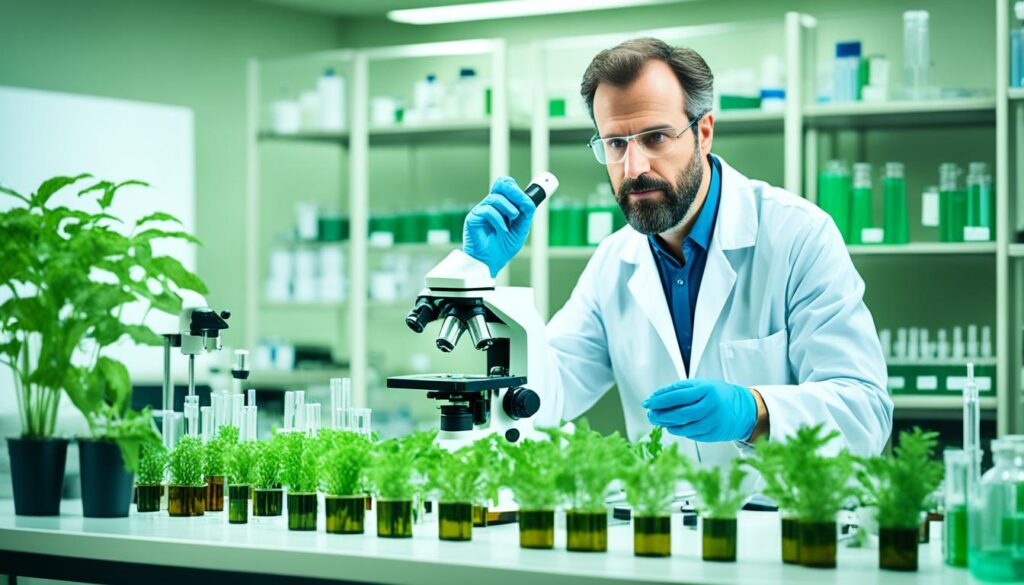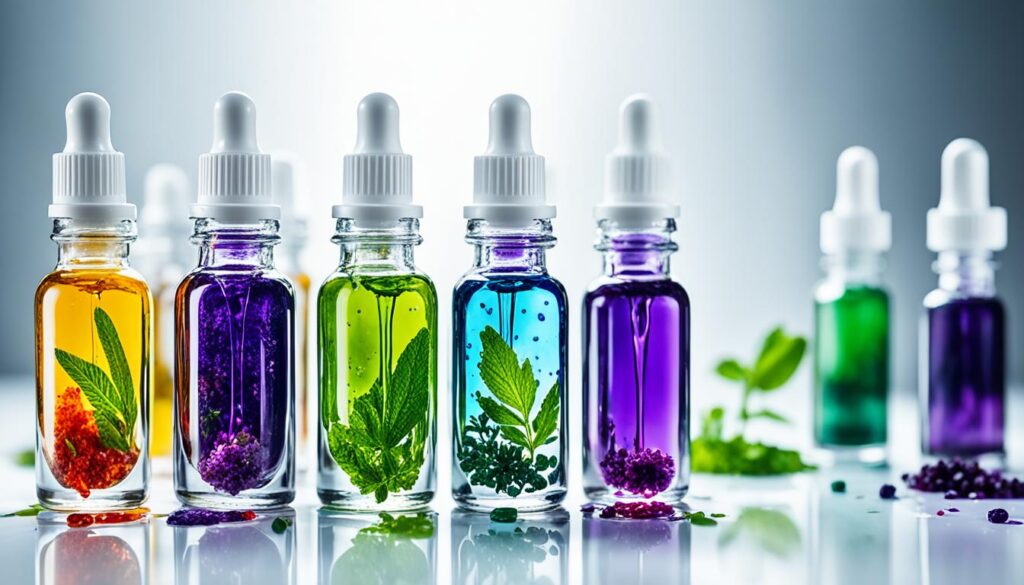Herbal tinctures are becoming known for their strong health benefits. But, what are they exactly? And how do they help our health and well-being?
An herbal tincture is a strong liquid made from herbs. It’s made by soaking the parts of the herb in alcohol or vinegar. This process pulls out the best parts of the herb. These liquids are very easy to use.
People have been making and using tinctures for thousands of years. They were used by the ancient Egyptians and those in the Middle Ages. Even today, people often turn to them for health support.
Key takeaways:
- Herbal tinctures are strong liquids made from herbs for health purposes.
- They are extracted by soaking herb parts in alcohol or vinegar.
- Parts like leaves, bark, berries, and roots can be used to make tinctures.
- Always check with a doctor before using these strong supplements. They are not checked by the FDA.
How to Prepare an Herbal Tincture at Home
Making an herbal tincture at home is easy and fun. With just a few steps, you’ll have your own tincture. This method uses safe plant parts. Here’s a guide to making your herbal tincture.
- Gather the Desired Parts of the Herb: Choose the plant parts for your tincture. You can use dried or fresh leaves, bark, berries, and more. Just be sure you know the plant and use safe parts.
- Wash and Chop the Herb: Clean the plant parts well to get rid of dirt. Then, if needed, cut them into smaller pieces. This helps with the extraction process.
- Choose Your Alcohol or Vinegar: Pick which solvent to use. Alcohol is often chosen for its strong extraction properties. The ratio of alcohol to herb changes if you use fresh or dried plants.
- Calculate the Alcohol Ratio: Fresh herbs usually need a 1:1 alcohol ratio. For dried herbs, a 1:4 ratio is common. You might need to adjust the ratio for your specific herb.
- Place the Herb in an Airtight Jar: Put the herb in a clean, sterile glass jar. Use a wide-mouthed jar for easy handling.
- Pour the Alcohol or Vinegar: Add the solvent over the herb. It should cover all the plant parts by at least an inch. Then, seal the jar tightly.
- Soak the Herb: Let the herb soak for at least 6 weeks. This allows the solvent to absorb the herb’s properties. Some tinctures need more time, so check specific recipes.
- Shake the Jar: Every few days, give the jar a gentle shake. This mixes the tincture well, making it more effective.
- Strain the Tincture: After soaking, strain the tincture to remove plant pieces. Use a fine sieve or cloth to separate them. Squeeze the plant parts to get every drop out.
- Label Your Tincture: Always label your tincture with important details. This includes herb names, alcohol type, and when you made it. Adding usage tips is helpful, too.
By following these steps, you can make herbal tinctures at home. It’s a great way to explore the benefits of different herbs. Have fun making your own natural remedies.
“The art of making herbal tinctures at home is a centuries-old tradition that allows individuals to harness the therapeutic properties of plants in a concentrated, liquid form.”
How to Use Herbal Tinctures
Herbal tinctures come in liquid form and are easy to use. They help you get the most out of plant remedies. Here’s how you can use them effectively.
Dosage and Administration
Always stick to the dosage info from the maker or a health pro. You normally take herbal tinctures by mouth. Just drop it under your tongue. This way, it gets into your system fast.
To make the most of it, hold the tincture in your mouth for a bit. This helps your body absorb it quickly. It goes straight into your bloodstream, not your gut.
After you’ve swallowed, rinse your mouth with water. This can get rid of any bad taste. It helps, especially if you don’t like the flavor.
Special Considerations for Children
Be careful when giving herbal tinctures to kids. Always check with a doctor first. Children need special doses and different care. Make sure you’re on the right track with a professional’s advice.
Tincture Recipes
There are many tincture mixtures, each for a specific need. They blend herbs in a special way. This boosts what each herb can do. You can even make your own tinctures. There are recipes online for different health goals like boosting your immune system, easing stress, and taking care of your skin.
Making tinctures at home requires some know-how. If you’re new, it might be best to buy some. Or get help from an herbalist.
Using herbal tinctures is a great way to take care of yourself. Just make sure to use them right. Then, you can really feel the benefits of these natural products.
Common Herbal Tinctures and Their Benefits
Herbal tinctures are a natural form of plant-based remedies. They come in a concentrated liquid. These remedies can help with various health issues. Let’s look at some well-known herbal tinctures and what they can do for you.
Propolis Tincture
Propolis is a sticky material bees collect from trees. It’s known for helping treat allergies and skin problems. Researchers say it works because it fights germs and reduces swelling.
Elderberry Tincture
Elderberry tinctures are loved for their ability to boost the immune system. They help by fighting inflammation. This makes them great for dealing with colds, the flu, and even asthma.
Cannabis Tincture
Cannabis tinctures are made from the marijuana plant. They are being looked at closely for their health benefits. Approved by the FDA for certain medicinal uses, they can help with pain, seizures, and sickness. Unlike using marijuana by smoking or eating it, these tinctures are not addictive. They work quickly and their effects last a long time.
Turmeric Tincture
Turmeric is a yellow spice with anti-inflammatory elements. It’s been used in health traditions for years. Although not as powerful as some drugs for easing pain, turmeric tinctures are good for fighting inflammation-caused conditions, like arthritis.
Benzoin Tincture
Benzoin tincture comes from a tree’s resin. It has anti-inflammatory and germ-killing benefits. This makes it good for respiratory issues, pain, and skin problems.
Echinacea Tincture
Echinacea tinctures are popular for boosting the immune system. People think they can fight various health problems and detox the body. While the science on this is not as clear, many use echinacea for immune support.
These are some of the many herbal tinctures and what they might help with. Remember, just like any health product, herbal tinctures can have side effects and interact with other medicines. Always check with a doctor before using them to make sure it’s safe and right for you.
Safety Considerations for Herbal Tinctures
Using herbal tinctures means putting safety first. Although they offer many health benefits, it’s vital to know the risks. Here are some important safety tips:
Understanding Toxic Plants
Some herbs in tinctures might be toxic. Knowing which plant parts are safe is key. Always do your homework and trust reliable sources for safe tincture ingredients.
Allergic Reactions
Allergies to tinctures can happen. Check for signs like fever, itching, or swelling. If you have allergies, look at a tincture’s ingredients and talk to your doctor if you’re worried.
Interactions with Medications
Herbal tinctures might not mix well with some medicines. Talk to your doctor if you’re on medication. This can help prevent issues like liver damage or blood clotting problems.
Possible Side Effects
Even safe tinctures might cause upset stomachs or heartburn. Starting with a small dose can help. Always watch how your body reacts. If you feel sick, stop and see a doctor.
Consulting a Healthcare Professional
Before you start using herbal tinctures regularly, a doctor’s advice can be very helpful. This is especially important if you’re pregnant, have health issues, or take meds. They can make sure you use tinctures safely.
Keeping yourself safe is the most important thing about using herbal tinctures. By knowing the risks, learning about the plants, and getting expert advice, you can use tinctures safely.
The Regulation of Herbal Tinctures
In the United States, the FDA does not regulate herbal tinctures. Pharmaceutical drugs must pass tests and get approved. But, herbal tinctures do not have set FDA guidelines. There’s no official body making sure herbal tinctures are safe to use.
You can buy herbal tinctures in many places. Buying them online is very common now. You can find them from different brands and makers. Health food stores, some grocery stores, and drug stores also sell them.
When you buy herbal tinctures, be careful. Make sure you’re getting a safe and quality product. Buying from trusted sources is best. Also, read what others say in reviews. This will help you know if the tinctures work well and are reliable. Doing your homework on the brand and product is a smart move.
“The FDA does not regulate herbal tinctures, so it’s important to be diligent when buying them. Look for reputable brands and read reviews to ensure that you are getting a quality product.”
Even though the FDA doesn’t directly oversee herbal tinctures, there is some regulation. The DSHEA from 1994 manages making dietary supplements, which includes herbal products. This law adds a protective layer for consumers. It’s between the regulation of food and drugs.
There are also GMPs for manufacturers. These practices guide them on the quality, tracking the source, and cleanliness when making supplements. They aim to always keep the products safe and consistent.
But, there are debates on how to best regulate herbal remedies, including tinctures. Some want fewer restrictions on herbalists and other alternative health providers. In a few states, natural remedies are part of licensed practices like Naturopathic (ND) and acupuncturist (LAc). But, there’s no national certification for herbalists.
When using herbal tinctures, talk to your doctor first. They might be helpful for some health issues. But, getting the right advice and doing your research is crucial. Only use them with the guidance of a healthcare professional.
The Effectiveness of Herbal Tinctures
Herbal tinctures are becoming popular for health problems. Yet, we’re still learning about their benefits. There’s not enough science to fully prove they work for everyone.
Many people try herbal supplements as a different way to stay healthy. These come from plants and might help because they have active parts. But, remember, maybe not all herbs are safe.
Thinking about herbal tinctures? Watch out for safety and talk to your doctor first. They might not mix well with other medicines. Tell your doctor if you’re using them for a health plan that’s right for you.
How well herbal tinctures work can change. It depends on the herb’s quality, how it’s made, and your health need. Research before making herbs part of your health plan.
“While there is promising anecdotal evidence and historical use of herbal tinctures, it is vital to rely on more robust scientific research to determine their effectiveness and safety for specific health conditions.”
Sometimes, tinctures have been around a long time and seem to work. For instance, chamomile might help with anxiety and make cuts heal faster. Gingers can help stop queasiness. Ginseng might boost mood and immune system, which is good for some diabetics. Milk thistle can help the liver, while St. John’s wort and valerian can fight sadness and sleep problems.
Yet, herbs might not work the same for everyone. Always talk to your doctor for safe advice.
Also, even natural tinctures can have side effects. Some might not work well or make you allergic. Like, arnica for skin issues and benzoin for throat swelling, maybe not good for everyone.
If you plan to use tinctures, don’t rush. Getting advice from your doctor, doing your homework, and careful dosing are key. This can help you use herbs safely and effectively.
In summary, herbal tinctures are interesting for health issues. But, we need more proof they really work. It’s best to be careful and talk to a doctor before trying any. Learning and using herbs the right way can be good for your health.
Benefits and Risks of Herbal Tinctures
Herbal tinctures are becoming more popular for health needs. Around 80 percent of people worldwide use these extracts. They do this to keep well.
Tinctures like garlic can lower cholesterol. Ginseng may boost mood and the immune system. Milk thistle helps the liver, and Valerian root can make sleep better.
But, they also have risks. They might not mix well with some medications. This can lead to blood clot issues, liver harm, or stronger side effects of medicines.
Sometimes, people can be allergic to tinctures. Signs include a fever, itchy skin, hives, or even anaphylaxis. This is serious and needs quick medical help.
People with diabetes should be careful. Some herbs can lower blood sugar too much. Also, some plants are poisonous. Eating them could be very dangerous, even deadly.
Pesticides in tinctures can hurt health too. It’s vital to buy from trusted sources. Make sure what you get is free of toxins.
For the best use of tinctures, talk to a doctor. They can advise on what’s safe, how much to take, and if anything interferes with your medications. Use them carefully and as advised to prevent problems.
In the end, herbal tinctures can do good for your health. But, knowing the risks and getting advice from a doctor is key. With the right approach, tinctures can be a positive part of staying healthy all-over.
Tips for Using Herbal Tinctures Safely
Adding herbal tinctures to your daily health plan is great, but you must be careful. It’s important to know the risks and be safe. Here are some key tips for using them safely:
1. Be Aware of Medication Interactions
Remember the other medications or supplements you take. Some herbs might change how your medicine works or its side effects. Talking to a doctor before you start using herbal tinctures is wise.
2. Know Which Plants Are Toxic
Some plants in herbal tinctures can be harmful. It’s important to check if the plants are safe before making your tinctures at home. Or, buy tinctures from trusted places.
3. Watch Out for Possible Allergic Reactions
Pay attention to any herb allergies you might have. Allergies can cause mild or serious symptoms. Don’t use tinctures from plants you’re allergic to. Always do a patch test with a new tincture.
4. Consider Purchasing Tinctures Instead of Making Them at Home
Making tinctures at home can be hard to do safely because there’s not much oversight. Buying from trusted brands is a safer choice. They ensure their products are safe.
This way, you know the tinctures have been made with great care. It helps ensure they are safe to use.
Keep in mind, the FDA doesn’t regulate herbal tinctures. So, choosing reliable brands is essential for safety.
By sticking to these guidelines, you can safely use herbal tinctures. You’ll reap their benefits without risking your health.
Purchase Options for Herbal Tinctures
There are several ways to buy herbal tinctures. An easy method is through online shopping. It lets you look at many tinctures without leaving your house. You can check out different types and see what others think before buying. (Online shopping, tincture availability)
Health food stores are also a good place to find them. These stores focus on natural and organic products. So, they’re perfect if you prefer a holistic approach to staying healthy. (Health food stores, tincture availability)
If you’re looking for specific tinctures like propolis or elderberry, you’ll find them out there. They can provide health benefits for those wanting to feel better overall. But remember, not all tinctures will be available at every store. (Propolis tincture, elderberry tincture)
Vineyard Herbs Teas & Apothecary is one place worth checking out. They have a broad range, including Clear Sinus, Mood Mend, and Echinacea. But whether a particular tincture is in stock can change. For example, they might have Echinacea but not Clear Sinus. Always ask them for the most recent details about what’s available.
Reading reviews and checking what’s in the tincture is crucial before buying. It ensures you get a reliable product. Also, think about the price. Tinctures generally cost between $25.00 and $44.00. You might find some on sale, though. This could be a chance to save money. (Price range for herbal tinctures)
Finding and buying herbal tinctures has become simpler thanks to online and health food stores. If you want propolis tincture, elderberry, or others, do your homework. Choosing from trusted sources, focusing on quality, and understanding the benefits are key. This can guide you in making the best choice for your health.
The Benefits and Uses of Herbal Tinctures
Herbal tinctures are great for natural wellness. They are easy to use and let you enjoy herb benefits. These liquid extracts are strong and a great part of daily health.
Immune System Support
Some tinctures can help your immune system. Echinacea and elderberry are famous for this. They make your body stronger against sickness like colds.
Stress Relief and Relaxation
Dealing with stress is crucial these days. Tinctures like ashwagandha and chamomile can help. They calm you, improve sleep, and boost well-being.
Inflammation Reduction
Inflammation causes several health issues. Tinctures like turmeric and ginger fight inflammation. They help ease pain and discomfort.
Flexibility in Administration
Herbal tinctures can be used in many ways. Some are taken by mouth for quick effects. Others work through smell or on the skin. You can pick how to use them best in your life.
Use herbal tinctures carefully. Follow the recommended use, especially if you take other medicine. Talking to a doctor before using them is smart, especially if you are not feeling well or are expecting a baby.
Herbal tinctures support your health in a powerful, natural way. Adding them to your routine can lead to a healthier life. They are a proactive step towards wellness.
Frequently Asked Questions About Herbal Tinctures (FAQ)
1. What are the benefits of using herbal tinctures?
Herbal tinctures are a simple way to get the good stuff from plants. They are strong and easy to use. Benefits include helping the immune system, easing stress, aiding sleep, and boosting overall health.
2. How do herbal tinctures differ from essential oils?
Both come from plants, but they’re made differently. Herbal tinctures use alcohol or vinegar to pull out the plant’s good parts, creating a liquid mix. Essential oils, on the flip side, are super concentrated and made without alcohol or vinegar.
3. How to safely use herbal tinctures for health?
Stick to the dose info that comes with the tincture. You usually take them by mouth, putting a bit under your tongue. Swish it around in your mouth and then swallow. It’s smart to water down the amount for kids and to ask a doctor first.
4. Are herbal tinctures effective for stress relief?
Certain tinctures like chamomile and ashwagandha are known for calming effects. Everyone reacts differently though. Talking to a healthcare pro will give you a better idea for your individual needs.
5. How are herbal tinctures stored for longevity?
Keep tinctures in a cool place without too much light or heat. Make sure they don’t get too wet and always close the cap tightly. Each tincture could have specific storage rules, so check those for more advice.
